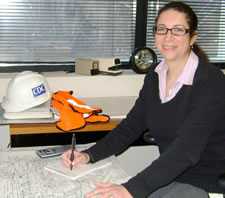CDC Women in STEM Careers - Rosally Rivera, BS
Mechanical Engineer, Quality Specialist
Quality and Sustainability Office, Office of Safety, Security and Asset Management, CDC

Her teenage dream was to be the first Hispanic woman on the moon. She had always liked building model airplanes and reading about space exploration. So why not reach for the stars?
But after the Space Shuttle Challenger exploded in 1986 with seven astronauts on board, Rosally Rivera started looking at other career paths. She chose what she thought was the closest field to aerospace engineering: mechanical engineering. It let her marry two of her passions—physics and materials science—to design mechanical systems.
Now a quality specialist at CDC, she still wouldn’t mind meeting Ellen Ochoa, the first Hispanic woman to travel to outer space, to hear what it was like.
“I believe women in science careers have a chance to make a big difference in the world,” Rivera says. “We bring a different perspective to our work in public health. When you think about it, we are great multitaskers. We juggle family and work. And we are able to bring that juggling skill to the workplace.”
Acing the Material
Even when I was a little kid, I loved to explore how model airplanes and cars were built. I would take electronic toys apart to see how they worked inside and try to put them back together. My parents let me use my imagination and didn’t hinder me.
Given my nature, I decided to study mechanical engineering, which combines physics and materials science. Mechanical engineers design systems for buildings. You may never have thought about the heating and air conditioning system in your home, school, or workplace, but someone had to design it.
I have a bachelor’s degree in mechanical engineering. As a woman in engineering, I have worked mostly with men throughout my career. That has its advantages and disadvantages. Even though I knew I could do the work, I had to prove myself. I learned to become tougher and more resilient. I learned not to take things personally.
Girls and women who choose careers in engineering are adventurous. These aren’t easy careers. There are more women engineers than when I first started. We’ve come a long way!
The Woman behind the Facelifts
"When I tell people I'm a mechanical engineer, they say, 'Wow! You must be really smart.' I tell them it’s not so much about being smart, but about working hard and always being willing to learn new things."
Working at CDC is one of the highlights of my career. As a Quality Specialist I provide oversight, direction, and assure accountability for quality process improvement in our organization. My work involves identifying and analyzing complex or sensitive issues, root causes, problems, and challenges facing the organization; formulating and evaluating possible courses of action for resolving them; drawing conclusions based on relevant facts; and recommending solutions to organizational leadership. I work to improve the efficiency, effectiveness, and customer service of our organization.
Advice to Girls and Young Women
- Treat everyone with respect, no matter who they are or what they do.
- Be willing to learn from others—and from your own mistakes! In engineering science I have met many people in other fields and have learned many things that help me in my career.
- Be a good listener. It’s amazing how much you can learn by just listening. We think we know all the answers, but there are people out there who have been around longer than us.
- Page last reviewed: September 24, 2015
- Page last updated: April 27, 2015
- Content source:


 ShareCompartir
ShareCompartir